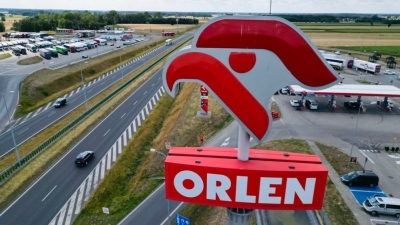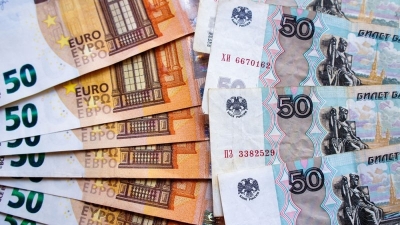NATO’s Trump contingency planning: Keep calm and invest

NATO’s European members have embarked on a mission to prove they are stepping up their burden-sharing efforts, in a bid to preempt the risks of a new Donald Trump presidency and preserve the alliance’s unity in the face of the most serious security challenges since World War Two.
Trump shocked European allies last weekend with comments suggesting that Russia can do “whatever the hell they want” with NATO members that fail to meet the 2% GDP defence spending target.
The question of how to protect the alliance’s integrity from a NATO-adverse American president has gained traction ahead of a NATO defence ministers meeting in Brussels on Thursday (15 February) and the Munich Security Conference next weekend.
A continued increase in defence spending may help gain Trump’s trust ahead of November should he be elected to replace incumbent US President Joe Biden, several NATO diplomats said.
Step 1: Invest
Europe’s first step to ‘Trump-proof’ NATO should include higher defence spending “to commit any US president to the security of the European continent”, should they question fair burden sharing again, according to several NATO diplomats.
An initial stride in this direction was taken on Wednesday (14 February), with NATO Secretary-General Jens Stoltenberg making a surprise announcement of new projected spending targets.
In 2024, eighteen out of 31 members will spend more than the required 2%, Stoltenberg said, compared to only seven European members in 2022.
The spending surge, Stoltenberg added, shows that European allies are making “real progress”.
After years of under-investment following the Cold War, European NATO members have recently taken steps to increase their ability to defend themselves and now agree that — especially after Russia invaded Ukraine — more defence spending is needed regardless of who will be the next US president.
“There is a lot of talk about Trump contingency planning in the Alliance (…), on how to make sure a US president is invested in the security of the transatlantic area”, one senior NATO diplomat said. His comments were echoed by others.
Burden-sharing in the Western military alliance will also top the agenda of the NATO leaders’ summit in July, two people with knowledge of the preparations told Euractiv.
But security experts say that despite the sense of urgency, the efforts are still lacking speed.
Europeans may now invest significantly more than during the Trump era, “but not fast enough,” Bruno Lété, visiting professor on Transatlantic relations at the College of Europe, told Euractiv.
The problem is that “all are doing it on their own time [despite] the sense of urgency, as we hear there might be a conflict or a war with Russia in the coming years,” Lété said, in reference to warnings of an upcoming war from Poland, Germany, Sweden, Denmark and the chief of the NATO military committee.
Step 2: Reassure
Another step to lock Trump’s ego in would be to “spend more time on the agenda discussing defence spending increases and other issues the president will find important, such as the challenges posed by China”, the first diplomat said.
European NATO members have been saying that they will continue to invest in the bloc’s defence not to please Trump or whoever sits in the White House after November, but because their security is at risk.
“Whether there is Trump or not Trump, we will have to become stronger,” Belgium’s defence minister Ludivine Dedonder told Euractiv in an interview last week.
Beyond that, the choice of the new NATO boss will also play a significant role, NATO sources said.
Dutch Prime Minister Mark Rutte, who has been in office for more than a decade and had a productive relationship with Trump, is said to have good prospects of landing the top job.
According to NATO diplomats, he could be the next ‘Trump-whisperer’, a term often used to describe incumbent Secretary-General Stoltenberg.
The Norwegian had strategically used media messaging, especially by appearing in American media, to make the case for NATO’s value and placate US leadership.
Trump’s harm potential
Trump’s recent remarks have nevertheless put in question the principle of alliance solidarity, several NATO diplomats told Euractiv.
“We agree that European allies need to spend more on defence, but [Trump’s] delivery was done in quite a horrible way this time,” the first NATO diplomat said, adding that “to cast doubt on the commitment [of mutual defence] is harmful”.
If Trump was serious, “it would be the end of NATO and deterrence because (…) the deterrent is that we stand together, that we have 80,000 US troops in Europe and have American nuclear weapons,” the diplomat warned.
Facing that issue, all “should do our best to remain united facing the most dangerous security situation for the collective West since the Second World War,” a second NATO diplomat said.
Lété warned that “the biggest threat to NATO is not Russia or China, but the internal challenges, and preserving the unity”.
NATO’s mutual defence clause is the reason why countries such as Finland and Sweden strived towards membership after Russia attacked Ukraine two years ago, and US support for Europeans is considered non-optional.
Read more with Euractiv




